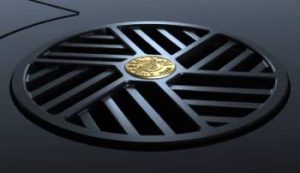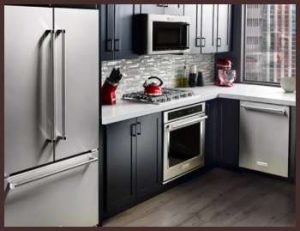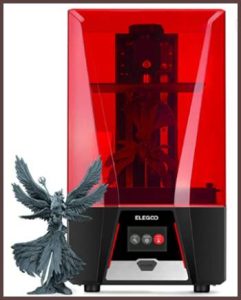Pressure washers are a popular tool for tackling all kinds of outdoor cleaning tasks. With the ability to blast away dirt, mold, mildew, and grime, they make quick work of cleaning driveways, patios, decks, siding, and more. Two brands known for their homeowner-friendly pressure washers are Westinghouse and Ryobi.
But which one offers the best value and performance?
In this comprehensive guide, we’ll compare Westinghouse and Ryobi pressure washer models across several categories to help you decide which is the better brand for your needs and budget.
A Brief Comparison Table
| Feature | Westinghouse | Ryobi |
| Power | 1300-1700 PSI | 1800-3200+ PSI |
| Water Flow Rate | 1.1-1.6 GPM | 1.2-2.7+ GPM |
| Power Source | Electric only | Electric and gas |
| Convenience Features | Basic | Advanced (built-in storage, wheels, etc) |
| Warranty | 2-3 years | 2-3 years (+3 years on motors for some models) |
| Price | $120-$180 | $120-$800+ |
| Best For | Basic residential use | Frequent/heavy duty residential and commercial use |
Overview of Westinghouse Pressure Washers
Westinghouse is a well-known brand name associated with appliances and electronics. When it comes to pressure washers, Westinghouse offers a range of light to medium duty electric models ideal for typical residential cleaning tasks.
Key features of Westinghouse pressure washers include:
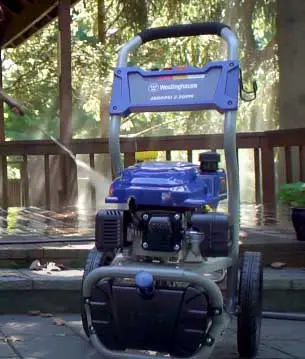
- Electric-powered – They run on standard household power rather than gas. This makes them quieter and more environmentally friendly.
- Compact size – Westinghouse pressure washer units tend to have space-saving designs to aid storage and portability.
- Affordable pricing – With most models costing $150 or less, they offer an attractive value.
- Standard connections – Westinghouse pressure washers use garden hose connections for the water supply.
- Decent power – With psi levels typically around 1300-1700 and GPM ratings of 1.1-1.6, Westinghouse pressure washers pack adequate cleaning power for home use.
- 2-3 year warranties – Covering the pump and other key components. Gives added peace of mind.
Ideal for cleaning driveways, sidewalks, patios, lawn equipment, vehicles, decks, grills, and other solid surfaces around the home.
The lighter duty electric power plants limit their suitability for absolutely heavy duty jobs, but overall Westinghouse pressure washers deliver very respectable cleaning performance for the price.
Overview of Ryobi Pressure Washers
Known for power tools and lawn equipment, Ryobi also produces a popular line of consumer-targeted pressure washers. Like Westinghouse, Ryobi emphasizes electric models but offers gas pressure washers too.
Standout features of Ryobi pressure washers include:
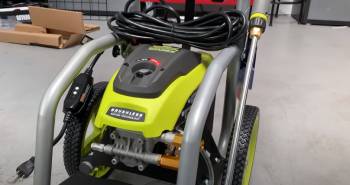
- Wide range of models – From light duty electric to heavy duty gas, Ryobi has pressure washers suited for light home tasks up to commercial use.
- Innovative designs – Ryobi incorporates clever touches like built-in storage for nozzles and cords.
- Battery powered available – Select Ryobi pressure washer models run on 40V lithium-ion batteries for ultimate cordless convenience.
- Good power and performance – Pro-level models like the RY803001 put out up to 3200 psi for intense cleaning strength equal to many commercial units. Even lower-priced models offer decent 1800-2000+ psi.
- Durable and reliable – Designed to withstand frequent use thanks to brass pump heads, steel frames, and other robust components.
- Decent 2-3 year warranties – Plus 3-year warranty on brushless electric motors found on some models.
Ryobi pressure washers cost a bit more than comparable Westinghouse models in most cases. But the brand is known for quality and cleaning power that edges out Westinghouse.
Water Pressure (PSI) Comparison
The peak water pressure rating measured in PSI (pounds per square inch) determines the cleaning strength of a pressure washer. Higher psi enables more aggressive dirt removal.
- Westinghouse Pressure Washer PSI Range: Most Westinghouse pressure washers have psi ratings of 1300 to 1700 PSI. This puts them on the lighter duty end of the cleaning spectrum. Still ample for typical residential cleaning tasks around the home. But they lack the high end psi needed for really tough jobs.
- Ryobi Pressure Washer PSI Range: Ryobi pressure washers start around 1800 PSI on the low end. Many popular models aimed at homeowners offer 2000-2300 PSI. Ryobi’s flagship gas-powered units boast 3000+ PSI for commercial grade cleaning clout. Overall, Ryobi offers a much wider and more powerful PSI range versus Westinghouse.
Winner: Ryobi – With light, medium, and heavy duty pressure washer models topping 3000+ PSI, Ryobi clearly offers superior cleaning power and versatility. Westinghouse pressure washers cluster in the mediocre 1300-1700 PSI range.
Water Flow Rate (GPM) Comparison
The gallons per minute (GPM) rating indicates the volume of water flow through the pressure washer. Higher GPM enables cleaning larger surfaces more quickly and efficiently.
- Westinghouse Pressure Washer GPM Range: Westinghouse pressure washers have relatively low GPM, typically between 1.1 to 1.6 GPM. This allows reasonable cleaning times for home uses. But performance is constrained for larger jobs.
- Ryobi Pressure Washer GPM Range: Ryobi offers a much broader GPM range. Entry-level models have 1.2 GPM flow rates. Mid-tier units aimed at homeowners jump to 1.7-2.0 GPM. Pro-sumer and commercial Ryobi pressure washers deliver upwards of 2.7 GPM for fast cleaning over large areas.
Winner: Ryobi – With light, medium, and heavy duty pressure washer models topping 2.7+ GPM, Ryobi offers superior water volume and cleaning speed compared to the slower low-flow Westinghouse models.
Power Source Comparison
Pressure washers derive power from either gas engines or electric motors. Each power plant has pros and cons.
Westinghouse Pressure Washer Power: As an electric-only brand, all Westinghouse pressure washers run on standard household electric power. Most have 120V plugs, some have 240V connections for added oomph.
Ryobi Pressure Washer Power: Ryobi offers both electric and gas engine powered pressure washers:
- Electric pressure washers – Equipped with 120V or 240V electric motors. More affordable and convenient for home users. Tend to have lower PSI capabilities.
- Gas pressure washers – Powered by heavy duty gas engines up to 208cc. Deliver extreme 3000+ PSI cleaning strength. More noisy and costly to operate.
Winner: Tie – For pure convenience, the all-electric Westinghouse models are easier to use around the home. But Ryobi’s Pro-level gas models offer commercial cleaning power no electric pressure washer can match. Overall a tie – choose electric for easier home use or gas for ultimate performance.
Convenience Features Comparison
Today’s pressure washers offer handy convenience features that make cleaning faster, easier, and more efficient. Let’s compare Westinghouse and Ryobi on key convenience factors:
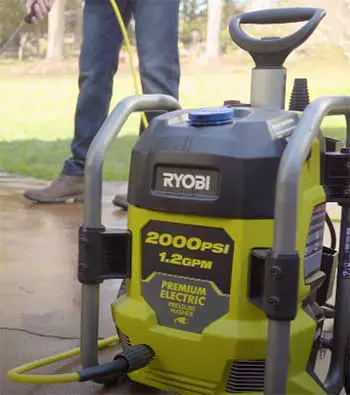
- Detergent Tanks – Allow applying soap along with water pressure for better cleaning results. Most Westinghouse and Ryobi pressure washers include detergent tanks. Ryobi’s are larger on some models.
- Onboard Storage – For stowing nozzles, power cords, and other accessories. Ryobi designs typically include better integrated storage options.
- Wheels & Portability – Make it easier to maneuver the pressure washer around your property. Again, Ryobi offers better wheeled/portable designs overall. Some Westinghouse models lack wheels.
- Nozzles – Interchangeable nozzles optimize the spray pattern for different cleaning purposes. Both brands provide an assortment of nozzle tips. Slight edge to Ryobi for including rotating nozzles on some models.
- Weight – Lighter units are easier to move around and control. Varies by model. But Ryobi has better power-to-weight ratios on its electric pressure washers.
- Winner: Ryobi – When it comes to thoughtful design conveniences, Ryobi outshines Westinghouse. Built-in storage, wheeled mobility, and other features give Ryobi pressure washers the ease-of-use advantage.
Warranties Compared
It’s reassuring to have strong warranty coverage protecting your pressure washer purchase. Warranties vary by model, but in general:
- Westinghouse Pressure Washer Warranties: Typical Westinghouse pressure washer warranties span 2-3 years and cover the pump and selected parts. Coverage is average but gets the job done.
- Ryobi Pressure Washer Warranties: Ryobi offers comparable 2-3 year limited warranties on its lower-end pressure washer models. But the brand ups the coverage to 3 years on motors for higher-end units. Ryobi also has a large service network if repairs are needed.
Winner: Ryobi – The extra year of coverage on Ryobi’s brushless electric motors gives their premium pressure washers an edge here. Ryobi’s more extensive service network is added peace of mind.
Also Read: Differences Between Generac And Simpson Pressure Washers.
Price Comparison
Affordability is often a major factor when shopping for a home pressure washer. Let’s see how Westinghouse and Ryobi stack up on price:
- Westinghouse Pressure Washer Prices: Average around $120-$180 for light duty electric models. Represent solid value for the performance.
- Ryobi Pressure Washer Prices: Wider price range from $120 for basic units up to $800+ for heavy duty gas models. Expect to pay $180-$350 for Ryobi’s medium duty electric residential pressure washers.
Winner: Westinghouse – Strictly comparing base models for home use, Westinghouse pressure washers retail for less than comparable Ryobi units. If you’re looking for an affordable entry-level residential pressure washer, Westinghouse offers very wallet-friendly prices.
Customer Reviews Comparison
Looking at actual customer experiences and ratings provides great insight into real world performance and satisfaction. Here’s how Westinghouse and Ryobi pressure washers stack up in customer reviews:
Westinghouse Pressure Washer Reviews
- Amazon Rating: 4 out of 5 stars (from 500+ reviews)
- Positive Feedback: Easy to set up and use. Good value for the money. Suitable power for home cleaning tasks. Quiet operation.
- Complaints: Cheap plastic fittings prone to cracking and leaking. Short power cords. Some durability issues long term.
Ryobi Pressure Washer Reviews
- Amazon Rating: 4 out of 5 stars (from 3000+ reviews)
- Positive Feedback: Powerful cleaning performance. High quality and durability. Lots of handy features. Good brand reputation.
- Complaints: On the pricey side. Gas models noisy and smelly. Battery operated models have short run times per charge.
Winner: Ryobi – Customers rate Ryobi pressure washers higher overall for performance, quality, and durability. The wider range of models also caters to more needs.
Best Uses Comparison
Determining which pressure washer brand is right for you depends largely on your intended uses and needs:
Westinghouse Pressure Washers Best For:
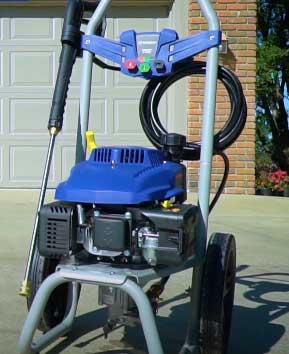
- Basic residential cleaning tasks
- Smaller homes and dwellings
- Tight budgets
- Occasional moderate duty cleaning
Ryobi Pressure Washers Best For:
- Frequent residential cleaning
- Larger homes and properties
- Customers wanting top-tier power and performance
- Commercial grade cleaning capabilities
- Battery-powered convenience
Winner: Depends! Westinghouse models are ideal for cost-conscious homeowners with basic needs. But Ryobi takes the crown for power, performance, and versatility across residential and commercial applications.
Also Read: Comparison of Ryobi And Greenworks Electric Pressure Washers.
Frequently Asked Questions (FAQ)
Westinghouse makes decent, affordable electric pressure washers well-suited for light duty home cleaning tasks. Models offer adequate 1300-1700 PSI power and standard features. Overall good for basic residential needs, but serious cleaning requires more power.
For residential use, Ryobi is widely regarded as the best brand for its combination of cleaning power, durability, features, and reputation. Commercial operators have more options, but Ryobi’s pro-grade gas models are top-tier. Other leading consumer brands include Sun Joe, Greenworks, and Karcher.
Yes, Ryobi makes excellent pressure washers. Homeowners rave about their power, performance, and reliability. Pro contractors rely on Ryobi’s commercial units for their ruggedness and cleaning muscle. Reviews indicate Ryobi pressure washers stand up very well versus competitors.
Westinghouse only makes electric powered pressure washers. They use common universal brushless electric motors in the 1.5-2 horsepower range. No Westinghouse pressure washer models run on gas engines. For the ultimate in gas engine power, Ryobi is the brand to look at.
Verdict: Ryobi Is The Superior Pressure Washer Brand Overall
When comparing Westinghouse and Ryobi across the board, Ryobi emerges as the winner in most categories that matter. Although Westinghouse has its niche in the budget-friendly corner of the market, Ryobi dominates when it comes to:
- Cleaning power – Much higher PSI and GPM abilities
- Performance – More suited for frequent and heavy duty use
- Features – Thoughtful extras that aid convenience
- Durability and reliability – Proven ability to withstand rigors of regular use
- Warranties and service – Stronger coverage and support network
- Versatility – Huge range of electric and gas models fit any need
For homeowners wanting the best bang for buck from occasional moderate duty cleaning, Westinghouse pressure washers will do the job.
But for more intensive residential use plus the option to scale up to commercial-grade power, Ryobi reigns supreme as the superior pressure washer brand. Their innovation, performance, and reputation make Ryobi hard to beat for any application.
In Closing
Getting the right pressure washer makes cleaning and maintenance around your home quicker and easier. Both Westinghouse and Ryobi offer quality options.
But when pitting Westinghouse and Ryobi pressure washers head to head, Ryobi emerges as the winner for residential buyers wanting power, reliability, and versatility.
Hopefully this detailed comparison helps shed light on which brand best fits your cleaning style, requirements, and budget!

